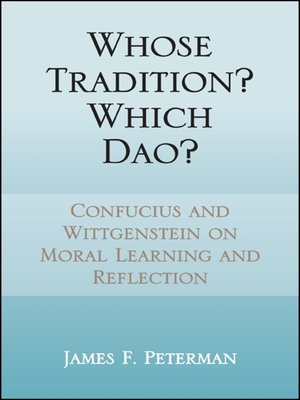Whose Tradition? Which Dao?
ebook ∣ Confucius and Wittgenstein on Moral Learning and Reflection · SUNY Series in Chinese Philosophy and Culture
By James F. Peterman

Sign up to save your library
With an OverDrive account, you can save your favorite libraries for at-a-glance information about availability. Find out more about OverDrive accounts.
Find this title in Libby, the library reading app by OverDrive.



Search for a digital library with this title
Title found at these libraries:
| Library Name | Distance |
|---|---|
| Loading... |
Considers the notable similarities between the thought of Confucius and Wittgenstein.
In an incisive work of comparative philosophy, James F. Peterman considers the similarities between early Chinese ethicist Confucius and mid-twentieth century philosopher Ludwig Wittgenstein. Their enduring legacies rest in no small part on projects to restore humanity to healthy ways of living and thinking. Confucius offers a method of answering ethical questions designed to get his interlocutors further along on the Dao, the path of right living. Struggling with his own forms of unhealthy philosophical confusion, Wittgenstein provides a method of philosophical therapy designed to help one come into agreement with norms embedded in our forms of life and speech. Highlighting similarities between the two philosophers, Peterman shows how Wittgensteinian critique can benefit from Confucian inquiry and how Confucian practice can benefit from Wittgensteinian investigations. Furthermore, in presenting a way to understand Confucius's Dao as concrete language games and forms of life, and Wittgenstein's therapeutic interventions as the most fitting philosophical orientation toward early Confucian ethics, Peterman offers Western thinkers a new, sophisticated understanding of Confucius as a philosopher.







